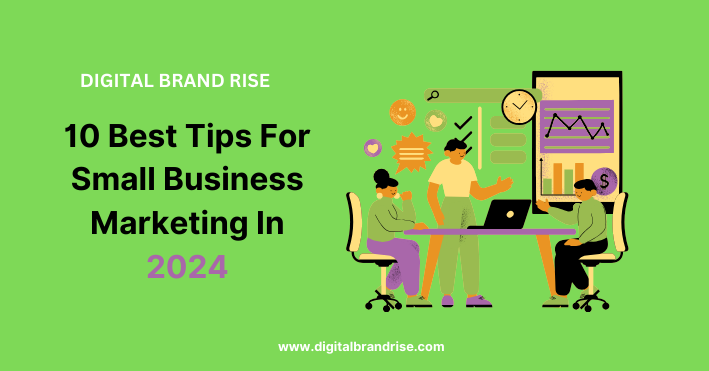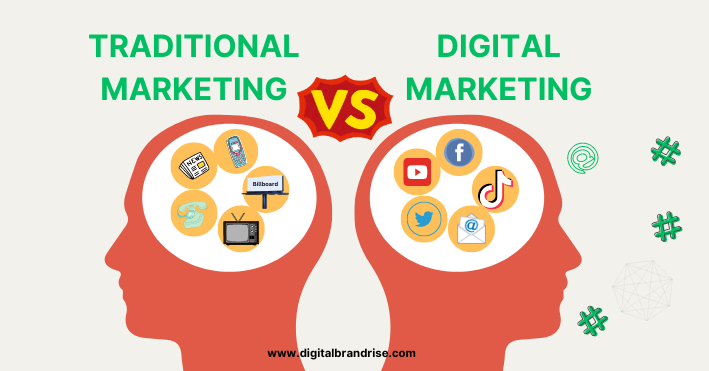Small businesses nowadays prioritize being found online, but they also have other choices. Each business has a different way of connecting with and maintaining its target audience. Goals, budget limits, target audience, and offerings of products all play an important part. Improving your marketing strategy is essential, especially when you are in the early stages. Take a look at these ten easy tips for 2024 small business marketing.
What is Small Business Marketing?
Small business marketing involves employing strategies to promote products or services to potential customers. Small businesses, in comparison to bigger businesses, often have restricted funds, so it is important to concentrate on low-cost marketing ideas. Key features for small business marketing include adaptability and flexibility, which enable rapid adaptations to changing market conditions.
Genuine relationships with customers are built through prioritizing personalized approaches and community engagement. To reach the target group, both offline and online methods are used, such as social media marketing and local events. To maximize impact while staying within budgetary limits, small business marketing requires creativity and innovation.
Small businesses can thrive and effectively compete by utilizing their unique capabilities. Small businesses can succeed despite their limited resources by using creative marketing strategies and building genuine relationships with clients.
10 Best Tips for Small Business Marketing in 2024
1. Know Your Audience
Understanding the audience you are targeting is necessary for effective small business marketing. To identify the preferences, pain points, and demographics of your target market, conduct in-depth research. Gain insightful knowledge about consumer behavior by utilizing tools such as social media insights and Google Analytics.
Tip: Create buyer personas to represent your target customer. These personas must contain details about challenges, interests, behaviors, and demographics. Utilize social listening, interviews, and surveys to compile information and improve your comprehension of your audience over time.
2. Social Media Marketing
Social media marketing is still a key component of small business marketing plans in 2024. Make a lasting impression on social media sites such as Facebook, Instagram, and LinkedIn. Use user-generated content, contests, and engaging content to interact with your audience.
Tip: Don’t merely concentrate on publishing material; actively interact with your audience by answering messages, comments, and mentions. Track engagement metrics with social media analytics and modify your approach as necessary. To keep your audience interested, try out several content formats including tales, polls, and videos.
3. Influencer Marketing
Increase the reach of your business by utilizing influencer marketing. Find influencers who fit your expertise and work with them on partnerships or sponsored content. Influencers who genuinely support a brand can greatly increase its visibility and trustworthiness.
Tip: When choosing influencers, give relevancy a higher priority than reach. Seek influencers whose audience fits your target demographic and whose beliefs match your business. To guarantee a win-win collaboration, clearly define the parameters and expectations from the very beginning.
4. SEO
To increase the visibility of your website on search engine results pages (SERPs), invest in search engine optimization (SEO). Do keyword research to make your content more relevant for search queries. To boost organic traffic, pay attention to both on-page and off-page SEO strategies.
Tip: To improve your website’s search engine ranks, add target keywords into the meta tags, headers, and URLs. Produce outstanding relevant content that speaks to user aim and benefits your audience’s interests. Through influencer outreach, content promotion, and guest blogging, you can obtain backlinks from reliable websites.
5. Content Marketing
In 2024, the content will still be king, therefore content marketing will be an essential part of small business marketing strategies. Produce top-notch, appropriate content that informs, amuses, or resolves issues for the target demographic. Include a variety of content types in your blog articles, videos, infographics, and podcasts to appeal to a range of tastes.
Tip: Create a content calendar that outlines the themes, topics, and release timetable for your material. To find relevant topics and make your content search engine optimized, do some keyword research. Repurpose your material for several platforms.
6. Referral Programs
Promote word-of-mouth advertising by implementing referral programs. Encourage current customers to recommend friends and family by providing special discounts, access to deals, or loyalty points. Use tools for referral tracking to make the process more efficient.
Tip: Give your customers individual referral links or codes to make it easier for them to recommend others. To encourage more participation, provide incentives to both the referral and the referee. Track the effectiveness of the referral program and make adjustments in response to comments and outcomes.
7. Build Partnerships
Establish strategic partnerships with similar businesses to broaden your market and reach new customers. Work together on joint campaigns, events, or goods and services that are co-branded. Developing connections that will benefit both parties can help your small business marketing efforts.
Tip: A helpful tip is to find possible partners whose audiences are similar to yours and whose goods or services enhance yours. Make contact with them and outline the advantages of working together. Formalize collaborations by putting roles, duties, and expectations in writing agreements.
8. Offer Free Samples
By providing free samples of your goods or services, you may bring in potential customers while creating buzz. Offering something of value upfront, such as a trial membership, product demonstration, or free consultation, can encourage conversions and cultivate goodwill among potential customers.
Tip: Make thoughtful use of complimentary samples to highlight the features and advantages of your products. Get the recipients’ contact information so you may stay in touch and develop leads. To increase your reach, encourage recipients to post about their experiences on social media and review sites.
9. Email Marketing
Even with the growth of more recent marketing channels, email marketing is still a useful and affordable strategy for small businesses. Encourage people to sign up for your email list by providing benefits. To present relevant content and offers, segment your target and make your email marketing unique.
Tip: To offer relevant information, segment your email list according to demographics, past purchases, and levels of involvement. Send re-engagement campaigns, abandoned cart reminders, and tailored welcome emails using automation technologies. To improve your campaigns over time, track email performance data like open, click-through, and conversion rates.
10. Sales
Small businesses depend on sales to generate money. Put into practice successful sales techniques including cross-selling, upselling, and customer retention. Use data analytics to monitor sales results and pinpoint areas in need of development.
Tip: Advice: Train the sales staff to put problem-solving and fostering relationships ahead of aggressive closing. Use a customer relationship management (CRM) system to efficiently manage leads and keep track of conversations. Provide outstanding customer service to build a loyal customer base and promote ongoing business.
Bottom Line
In 2024, the world of marketing is shifting rapidly, and small businesses must adapt to be competitive. Small business owners may reach their target audience, increase sales, and sustain long-term growth by implementing these ten best marketing strategies. Businesses need to maintain flexibility and experiment as needed. Small businesses can succeed in the changing business environment by being innovative and utilizing the latest technologies.
Frequently Asked Questions:
1. What are good marketing strategies for small businesses?
Effective marketing strategies for small businesses include knowing your audience, leveraging social media marketing, investing in SEO, and utilizing content marketing.
2. What is the best way to promote your online business?
Promoting your online business involves a multi-faceted approach, including social media marketing, SEO, content marketing, and email marketing.
3. Why should small businesses use digital marketing?
Digital marketing offers small businesses a cost-effective way to reach a larger audience, build brand awareness, and drive conversions in today’s digital landscape.
4. Is email marketing good for small businesses?
Yes, email marketing is an excellent tool for small businesses to engage with their audience, nurture leads, and drive sales with minimal cost.
5. Why is social media marketing good for small businesses?
Social media marketing allows small businesses to connect with their target audience, build brand loyalty, and increase visibility through engaging content and interactions.


